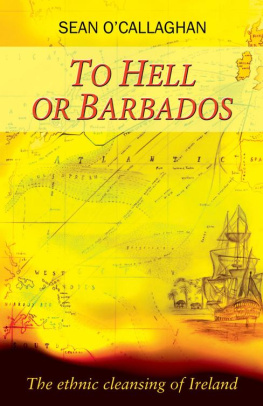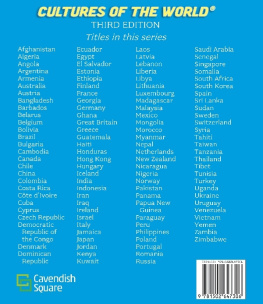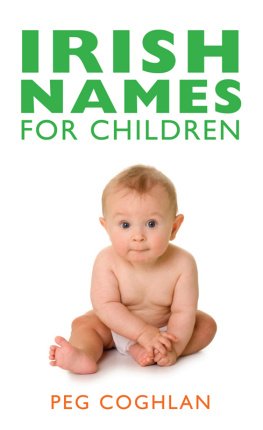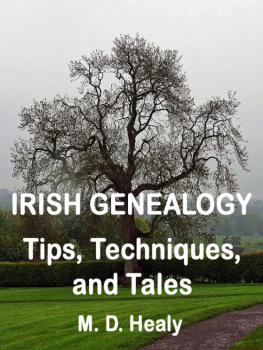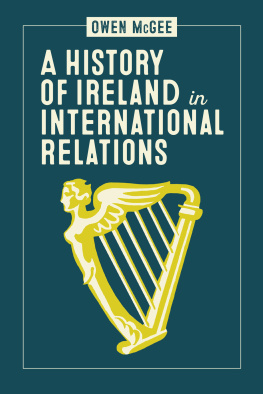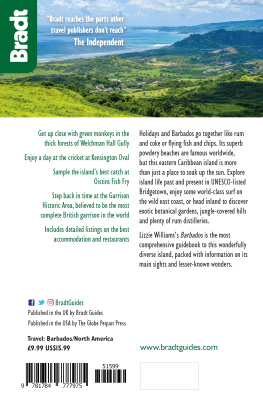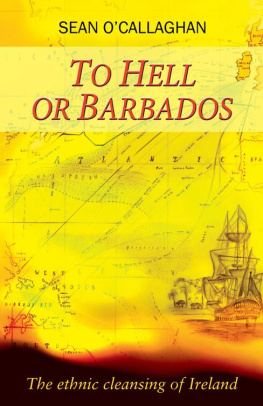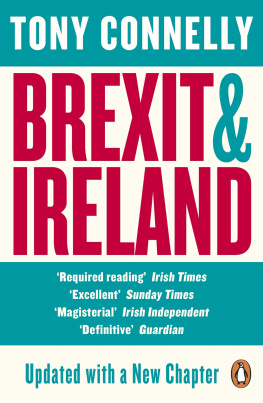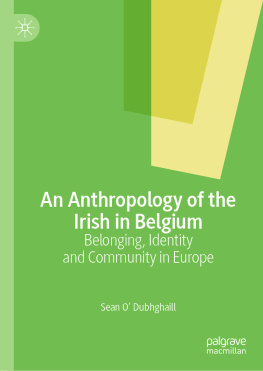Sean OCallaghan - To Hell or Barbados: The Ethnic Cleansing of Ireland
Here you can read online Sean OCallaghan - To Hell or Barbados: The Ethnic Cleansing of Ireland full text of the book (entire story) in english for free. Download pdf and epub, get meaning, cover and reviews about this ebook. year: 2013, publisher: The OBrien Press, genre: History. Description of the work, (preface) as well as reviews are available. Best literature library LitArk.com created for fans of good reading and offers a wide selection of genres:
Romance novel
Science fiction
Adventure
Detective
Science
History
Home and family
Prose
Art
Politics
Computer
Non-fiction
Religion
Business
Children
Humor
Choose a favorite category and find really read worthwhile books. Enjoy immersion in the world of imagination, feel the emotions of the characters or learn something new for yourself, make an fascinating discovery.
- Book:To Hell or Barbados: The Ethnic Cleansing of Ireland
- Author:
- Publisher:The OBrien Press
- Genre:
- Year:2013
- Rating:5 / 5
- Favourites:Add to favourites
- Your mark:
- 100
- 1
- 2
- 3
- 4
- 5
To Hell or Barbados: The Ethnic Cleansing of Ireland: summary, description and annotation
We offer to read an annotation, description, summary or preface (depends on what the author of the book "To Hell or Barbados: The Ethnic Cleansing of Ireland" wrote himself). If you haven't found the necessary information about the book — write in the comments, we will try to find it.
To Hell or Barbados: The Ethnic Cleansing of Ireland — read online for free the complete book (whole text) full work
Below is the text of the book, divided by pages. System saving the place of the last page read, allows you to conveniently read the book "To Hell or Barbados: The Ethnic Cleansing of Ireland" online for free, without having to search again every time where you left off. Put a bookmark, and you can go to the page where you finished reading at any time.
Font size:
Interval:
Bookmark:
To the Irish men, women and children
who lie in unhallowed ground
in the sugar cane fields of Barbados
Few, but readers of Old Colonial Papers and records are aware that a lively trade was carried on between England and the Plantations, as the Colonies were then called, from 1647 to 1690, in political prisoners, where they were sold by auction to the Colonists for various terms of years, sometimes for life.
Colonel A.B. Ellis,
White Slaves and Bond Servants in the Plantations (1883)
Those sold to the heretics in America are treated by them more cruelly than the slaves under the Turks; nor is any attention paid to youth or the decrepitude of old age, to sex or rank, to sacerdotal orders, to religious life.
Cardinal Giovanni Battista Rinuccini, papal nuncio to the Confederation of Kilkenny (164548)
When slavery is established in any part of the world, those who are free are by far the most proud and jealous of their freedom.
Edmund Burke, Irish statesman and orator (172997)
Many people have encouraged and helped me in the writing of this book. Chief among them I would single out Michael Carroll, M.A. of Bantry; Professor Kenneth L. Carroll of Maryland; C.F.J. MacCarthy (historian) of Cork; Ulick OConnor; Gregory OConnor, Archivist of National Archives, Dublin; Peter Simmonds, Ronald Taylor, Mrs Betty Carillo Shannon and, above all, Patrick Kelman Roach, all of Barbados. Patrick Roach was my guide and mentor there. Finally, thanks to Desiree Brincat and Yvonne Magri for typing the manuscript, as well as my wife, Halina, and son, Mark, for their advice, support and help.
To one and all, I owe a deep debt of gratitude.
Sean OCallaghan
Malta, July 2000
Writing a book on the ethnic cleansing of Ireland in the seventeenth century is a daunting task. Although the expression itself is modern, it applies well to the wholesale transportation of Irish men, women and children who were sold into slavery in Barbados and North America.
I had written books on slavery previously. The Slave Trade dealt with slavery in the Sudan, which is still taking place. The books I wrote on the white and yellow slave trades dealt with girls being sold into prostitution in Europe and the Far East. The collapse of the Iron Curtain has greatly increased the trade in Europe. In the Far East, female children and young girls are still a disposable commodity . Writing about Irish slavery is a different matter. So little material is available on the subject that we do not even know the numbers of people transported. One historian , the Reverend Aubrey Gwynn, SJ, who did considerable research on the subject in the 1930s, estimated that over 50,000 men, women and children were transported to Barbados and Virginia between 165259.
What became of them? Although I am not a historian, I determined to find out. There are no Irish records. They were destroyed when the Public Records Office in Dublin was burned in 1922.
The State Papers in the English Public Records Office in Kew yielded some information, as did the Shipping Register of the period, giving details of some of the ships engaged in the transportation as well as the names of their masters, but this was not enough. Did any records exist of the people transported or of their lives in the sugar fields of Barbados or in the tobacco fields of Virginia? One thing is certain, there is no record of any having ever returned, nor of any account of their sufferings.
I felt the answer must be in Barbados. I wrote to the librarian of the Barbados Museum and Historical Society. Three weeks later I received a reply from Mrs Betty Shannon, the librarian. In a letter she informed me that the library contained a quantity of files on Irish, Scottish and African slaves. It was more than I could have hoped for. I left for Barbados in August 1993. This book is the result.
I am persuaded that this is a righteous judgement of God upon these barbarous wretches, who have imbrued their hands in so much innocent blood and that it will tend to prevent the effusion of blood for the future.
Letter written by Oliver Cromwell after Drogheda (1649)
T HE C IVIL W AR in England was over. Many of the vanquished Cavaliers lay in jails and lock-ups, there to await transportation to Barbados. After the execution of Charles I and the ending of the monarchy, a new republic was established with Oliver Cromwell as first president of its Council of State. Its forty members were mainly merchants, with a sprinkling of lawyers and army officers.
Many problems faced the new Commonwealth. There was discontent in the country and problems with the army, including a mutiny in Banbury and at Salisbury among the troops destined for Ireland. This mutiny was quelled by Cromwell and Sir Thomas Fairfax, who had three of the ringleaders shot.
Cromwells greatest preoccupation, however, was with Ireland. Since the beheading of the king and resignation of the royalist lord lieutenant of Ireland, James Butler, Earl of Ormonde, his greatest fear was that all classes of Irishman, Protestant and Catholic alike, would unite to invade England.
If we do not endeavour to make good our interest there, and that timely, we shall not only have our interest rooted out there, but they will in a very short time be able to land forces in England and to put us to trouble here I had rather be overrun with a Cavalierish interest than a Scotch interest; I had rather be overrun with a Scotch interest than an Irish; and I think of all this is most dangerous. If they shall be able to carry on their work, they will make this the most miserable people in the earth, for all the world knows their barbarism.
This amply shows Cromwells frame of mind before leaving for Ireland. His fear was that the young Charles, who had been declared king in Scotland immediately after his fathers death, would land in Ireland, rally the people to the royalist cause and lead an invasion to England. In the summer of 1649 it seemed to Cromwell that Ireland had become a royalist state and the prospects of a successful English invasion of that country were receding with every passing day.
On 15 March 1649 the Council of State nominated him to command the troops for the invasion of Ireland. Cromwell hesitated for several reasons. In the first place his health had not been good since the previous Christmas, when he had a breakdown. He was also determined that he should have a free hand in Ireland and that the forces under his command would be properly equipped and provided for as he did not want soldiers to follow him out of personal loyalty. Finally, on 30 March, he accepted the nomination, saying that: It matters not who is our commander -in-chief if God be so.
All was now set for the invasion of Ireland and the reconquest of a country from the barbarous wretches who had spilled so much innocent blood in the rebellion of 1641. In 1641, eight years before his invasion of Ireland, the Irish rose in rebellion against the English and Scottish planters who had seized their lands during the Elizabethan plantations. The rebellion began in Ulster, which was the most heavily planted, and soon spread throughout the country until only Dublin and Derry remained in English hands. At the beginning of this rebellion only peasants took part, armed with pikes and pitchforks . They fell upon the settlers, killing men, women and children indiscriminately.
Sir John Temple, who was in Dublin Castle at the time the rebellion broke out, wrote in his History of the Horrid Rebellion in Ireland (1646): The crisis burst upon us with the suddenness of a violent torrent He claimed that the rebels, inflamed by Jesuits, did march on furiously destroying all the English, sparing neither sex nor age, most barbarously murdering them, and that with greater cruelty than was ever used among Turks or Infidels.
Font size:
Interval:
Bookmark:
Similar books «To Hell or Barbados: The Ethnic Cleansing of Ireland»
Look at similar books to To Hell or Barbados: The Ethnic Cleansing of Ireland. We have selected literature similar in name and meaning in the hope of providing readers with more options to find new, interesting, not yet read works.
Discussion, reviews of the book To Hell or Barbados: The Ethnic Cleansing of Ireland and just readers' own opinions. Leave your comments, write what you think about the work, its meaning or the main characters. Specify what exactly you liked and what you didn't like, and why you think so.

